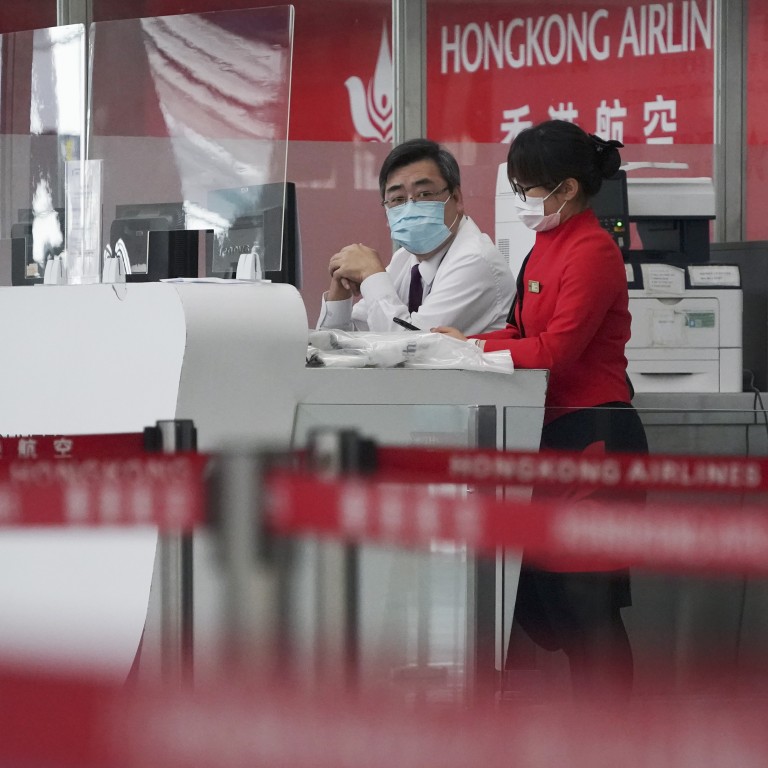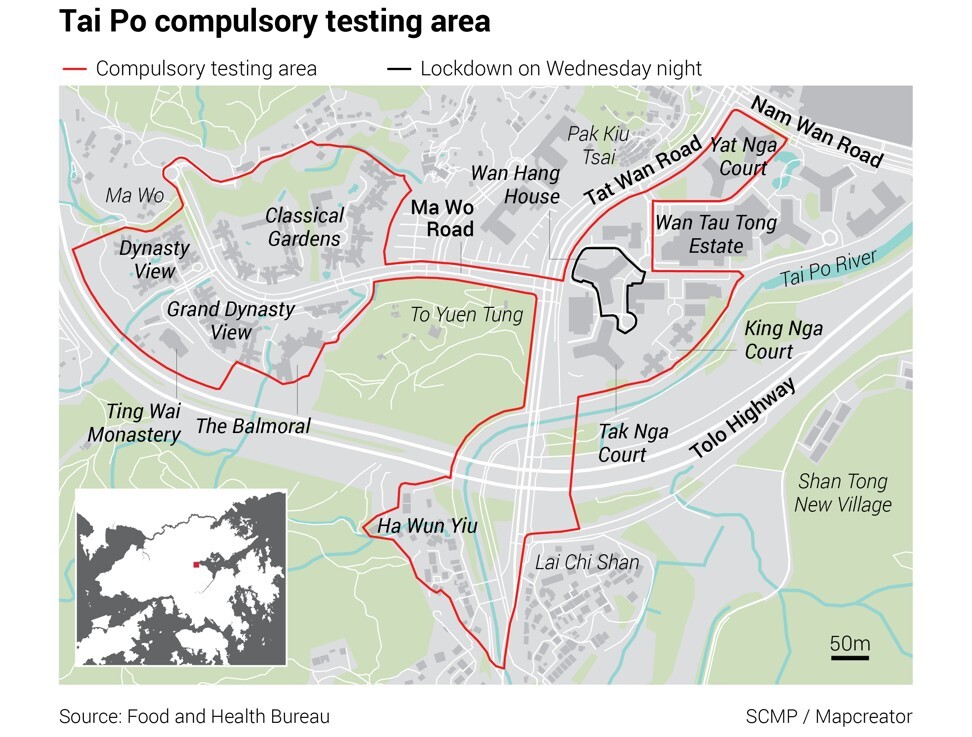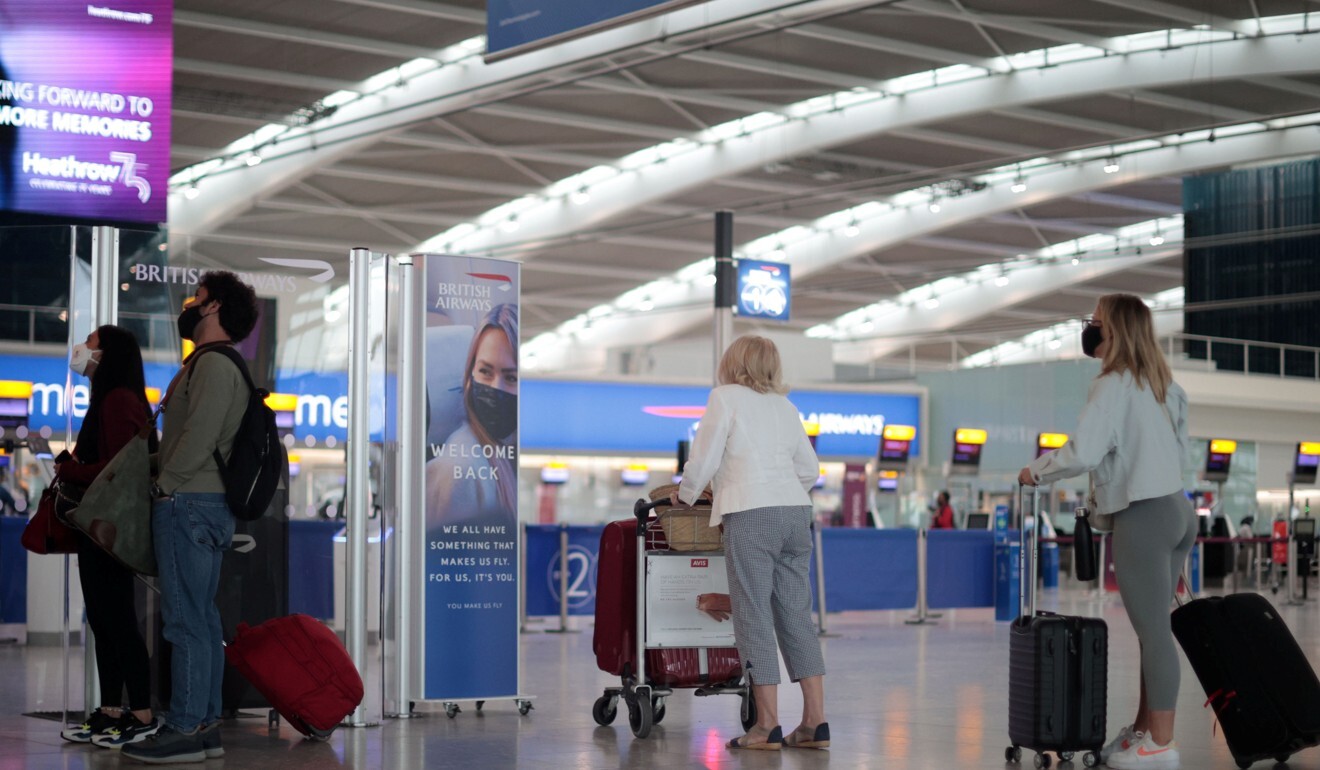
Coronavirus Hong Kong: city detects first suspected local case involving Delta variant; overnight lockdowns ordered in Tai Po
- As of Thursday morning, overnight testing had identified no positive cases at estate where coronavirus was detected in sewage samples
- If confirmed, the infection would end a 16-day streak of zero local cases
Wednesday’s preliminary-positive case, the source of which is unknown, involved an airport worker who lives in Tai Po, where the coronavirus was also detected in sewage samples. If confirmed, the infection would end a 16-day streak of zero local cases.
The suspected Delta case was discovered as the city moved to add Indonesia to its list of places deemed “extremely high-risk” after the amount of imported infections from the country triggered a suspension of flights. The designation means anyone who has been in the country for more than two hours is banned from entering Hong Kong.
Cross-border travel high on agenda as Hong Kong eases quarantine rules
The ban for Indonesia will kick in on Friday. Similar bans on India, Nepal, Pakistan and the Philippines would remain in place, the government said on Wednesday.
At 7pm on Wednesday evening, officials announced that Wan Hang House in Tai Po’s Wan Tau Tong Estate – where the suspected variant case lived – would be locked down so all residents could undergo compulsory coronavirus screening before 2am the next day. Any visitors who had been to the building for at least two hours between June 3 and Wednesday would also need to be tested by Friday.
As of Thursday morning, no positive cases had been found.
The lockdown came just hours after the government issued mandatory testing orders for eight nearby residential developments – Yat Nga Court, King Nga Court, Tak Nga Court, Classical Gardens, Dynasty View, Grand Dynasty View, The Balmoral and Ha Wun Yiu Village – after detecting a “very high viral load” in sewage samples from the area.

People who visited those developments between June 10 and Wednesday will also have to be tested by Friday. However, residents and visitors who are fully vaccinated are exempt.
Authorities said Wednesday’s preliminary-positive case was a 27-year-old man with no recent travel history, who was carrying a mutant strain of the coronavirus known as L452R. The L452R mutation is linked to several coronavirus variants, including the Delta one.
The Delta strain was first reported in India, and the World Health Organization has noted that it is on the way to becoming the dominant global strain.
The suspected Delta patient in Tai Po saw a doctor on Monday after developing a fever, sore throat and cough. A source said the man was found to have a high viral load.
The Department of Health said the man was an airline ground staff member and dealt with cargo flight crews as part of his job. He last went to work at the airport a week ago.
He also worked part-time providing customer service at Uptown Plaza in Tai Po, and last reported to work there on Tuesday.
A source told the Post that the man worked for Hong Kong Aviation Ground Services Limited, and was also involved in helping passengers while checking in, boarding and transferring flights
The Airport Authority announced on Wednesday night that all staff entering the facility’s restricted area would be required to present proof of full Covid-19 vaccination starting from August 1, meaning they have to receive two jabs 14 days before they enter the area.
Alternatively staff will have to present proof of a negative test result effective at the time to enter the restricted area, the authority said.
Earlier, the city confirmed two imported cases, as health experts called for Britain to be reclassified again as “very high risk”, with a 21-day quarantine imposed on arrivals from the country, regardless of their vaccination status.
Of the two imported infections, one was still being investigated, while the second was from Indonesia. The city’s official case tally stands at 11,898 confirmed infections, with 210 related deaths.
There were fewer than five preliminary-positive cases on Wednesday, including the Tai Po airport worker.
Dr Leung Chi-chiu, a respiratory medicine expert, said on Wednesday that authorities needed to act fast to contain the L452R mutation.
“The virus could spread really quickly. If we do not identify and trace other cases as soon as possible, they could leak into the community, and the fifth wave could happen at any moment,” Leung said.
He added that it was worrying to see that sewage samples from an area with multiple buildings had tested positive for the coronavirus, noting that the levels found in the samples suggested there were recent infections.
Leung said it was possible that the Tai Po patient was infected by an imported case from Indonesia, which has recently experienced a surge of infections. Many of the imported cases from Indonesia detected in Hong Kong have also carried the L452R mutation.
Authorities have widely used technology, developed by a team from the University of Hong Kong’s (HKU) department of civil engineering and medical faculty, to test for the coronavirus in sewage samples. The method successfully uncovered hidden carriers in two public housing blocks last December, triggering mandatory testing at Fung Chak House and Kai Fai House in Choi Hung’s Choi Wan (II) Estate.
Meanwhile, earlier on Wednesday, Leung and HKU microbiologist Dr Ho Pak-leung said a surge in British Covid-19 cases – including many involving mutant variants – along with the expected return of pupils studying there for the summer, suggested a more cautious approach to the country was needed.
Britain recorded more than 11,600 confirmed infections on Tuesday amid an increasing spread of the Delta variant – the highest tally since mid-February.

Hong Kong authorities last month downgraded Britain from “very high risk” to “high risk” following a drop in cases and a rise in vaccination rates.
Under proposed revisions to quarantine arrangements for arrivals, fully vaccinated travellers from “high risk” countries such as Britain, Canada and the United States, would only need to isolate for seven days if they tested positive for antibodies.
But Ho said he believed reducing quarantine for arrivals from Britain would be too risky, warning it could set off another wave of infections in Hong Kong.
“In June, Hong Kong has seen four imported cases so far from Britain, compared with no cases in May … All of them carry the [Delta] variant,” he told a radio programme on Wednesday. “There is no reason for the government to reduce the mandatory quarantine period at designated hotels for arrivals from Britain to seven days, even if they are fully vaccinated.”
Leung said although a flight ban on Britain was not yet necessary, greater caution was important at this stage.
He also suggested the government look into bumping Indonesia up from “very high risk” to “extremely high risk” and impose a flight ban following a recent spike of cases. Barring that, it should at least impose much tighter testing, quarantine and vaccination requirements on travellers from the country, he added.
Calls for Hong Kong to expand quarantine exemptions to more business sectors
“There must also be strict requirements and monitoring in the whole process,” Hui told lawmakers on Wednesday.
He said two of the 151 applications received by the financial regulatory agencies for quarantine-free entry had been approved as of Tuesday.
Additional reporting by Chan Ho-him


